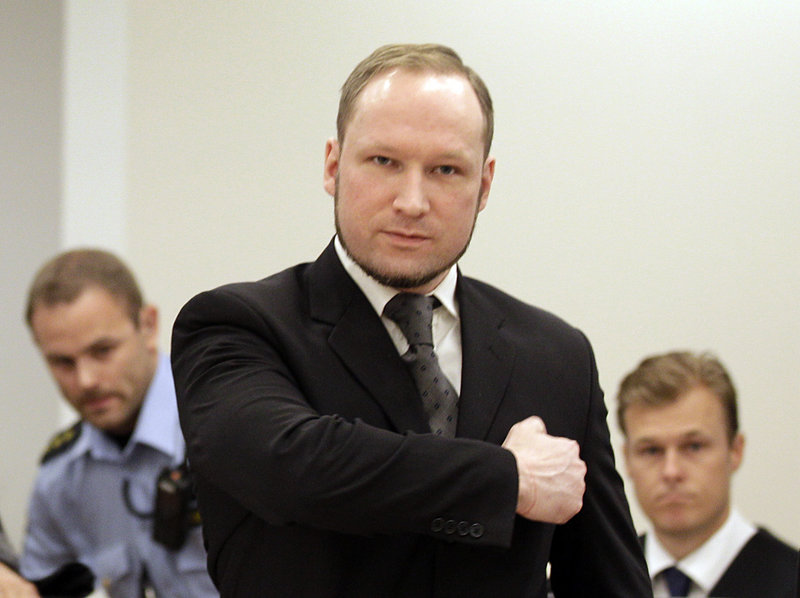LONDON – It was the decision many Norwegians were hoping for, 13 months after their country’s worst peacetime massacre. It was also the verdict that the killer himself wanted.
With a smile verging on a smirk, Anders Behring Breivik listened to a panel of Norwegian judges declare Friday that he was sane and therefore criminally responsible for twin attacks in Norway last year in which 77 people died, many of them teenagers whom he methodically hunted down and shot at close range.
In Breivik’s mind, the bloodbath was a perfectly rational act intended to ignite a revolution by Christian Europe against a Muslim takeover — with himself cast as a crusading knight.
But the 33-year-old Breivik now faces at least 21 years behind bars, the maximum allowed under Norwegian law.
The prison term can be renewed repeatedly if Breivik is deemed a threat to society, however, so it’s highly possible, even probable, that he will never walk free again.
In a statement after the verdict was read, Breivik tried to “apologize to all militant nationalists in Norway and in Europe” for not having slain more people, but the presiding judge cut him off.
Breivik said he did not recognize the Oslo court’s authority but that he would not appeal its decision, because that would “legitimize the court.”
Then, getting up from the table, he brought his fist to his chest and swept his arm out in a right-wing salute.
Whether consciously or not, the five judges who delivered their verdict sided with majority opinion in Norway, which wanted to see Breivik found criminally guilty of the attacks and locked up in prison rather than declared insane and committed to indefinite psychiatric care.
Breivik preferred that, too. He stood ready to file an appeal of an insanity verdict, an outcome he said would have been a fate worse than death, because it would reduce his militant anti-Muslim views to the ravings of a madman.
“A lot of us felt and feel relieved today,” Liv Torres, who survived the car bomb that Breivik planted in downtown Oslo, told the BBC. “It’s a closing of one chapter in this long book.”
The huge blast in Oslo’s government district killed eight people and acted as a decoy for the greater carnage to come on the nearby island of Utoya.
Dressed as a police officer, Breivik calmly tracked down and shot terrified attendees of a youth camp sponsored by the left-wing Labor Party, whose more liberal views on immigration he blamed for helping Europe commit “cultural suicide.”
In court Friday, one of the judges, Arne Lyng, dispassionately described the horror experienced on Utoya on July 22, 2011.
“In some places the living and the dead lay side by side. Some were paralyzed by fear as they were being shot at. Some pretended to be dead, while others begged for their lives,” the judge said in reading the verdict, which took a full court day. “Telephone calls were made and text messages were exchanged with family and friends, partly to ask for help, partly to calm them down and partly also to bid farewell.”
The judges’ eagerly awaited decision followed a 10-week trial, which wrapped up in June, and two months of deliberation.
That Breivik had gone on a killing rampage was never in dispute; rather, at issue before the court was whether he was criminally responsible or clinically insane.
Two teams of psychiatrists presented conflicting conclusions: One declared Breivik delusional, a paranoid schizophrenic with a warped view of reality, whereas a second evaluation found him sane.
In a reversal of the usual circumstances, prosecutors argued that the carefully plotted attacks were the product of a diseased mind, while Breivik’s lawyers, on his instruction, emphasized that he was fully aware of what he was doing and had a clear, if chilling, political aim.
The prosecution announced that it would not appeal Friday’s verdict to press for a finding of insanity. Kristian Andenaes, a professor of sociology and law at Oslo University, said an appeal would have been extremely unpopular.
“Very many people want to lay this case behind them,” Andenaes said. “It’s a very hard experience for those who are victims.”
Copy the Story Link
Send questions/comments to the editors.



Success. Please wait for the page to reload. If the page does not reload within 5 seconds, please refresh the page.
Enter your email and password to access comments.
Hi, to comment on stories you must . This profile is in addition to your subscription and website login.
Already have a commenting profile? .
Invalid username/password.
Please check your email to confirm and complete your registration.
Only subscribers are eligible to post comments. Please subscribe or login first for digital access. Here’s why.
Use the form below to reset your password. When you've submitted your account email, we will send an email with a reset code.